37 start with H start with H

Are nuclear arsenals safe from cyber-attack? Could terrorists launch a nuclear weapon through hacking? Are we standing at the edge of a major technological challenge to global nuclear order? These are among the many pressing security questions addressed in Andrew Futter’s ground-breaking study of the cyber threat to nuclear weapons.
Hacking the Bomb provides the first ever comprehensive assessment of this worrying and little-understood strategic development, and it explains how myriad new cyber challenges will impact the way that the world thinks about and manages the ultimate weapon. The book cuts through the hype surrounding the cyber phenomenon and provides a framework through which to understand and proactively address the implications of the emerging cyber-nuclear nexus. It does this by tracing the cyber challenge right across the nuclear weapons enterprise, explains the important differences between types of cyber threats, and unpacks how cyber capabilities will impact strategic thinking, nuclear balances, deterrence thinking, and crisis management. The book makes the case for restraint in the cyber realm when it comes to nuclear weapons given the considerable risks of commingling weapons of mass disruption with weapons of mass destruction, and argues against establishing a dangerous norm of “hacking the bomb.”
This timely book provides a starting point for an essential discussion about the challenges associated with the cyber-nuclear nexus, and will be of great interest to scholars and students of security studies as well as defense practitioners and policy makers.

Haki bil-Libnani provides students of Arabic with an opportunity to acquire substantial and systematic proficiency in Lebanese dialect and culture, and is designed to work either on its own or alongside the bestselling Arabic-language textbook Al-Kitaab Part One, Third Edition. This fully online textbook and interactive website features two video story components, designed to foster proficiency as students work through each lesson while practicing vocabulary, cultural expressions, and short dialogues. The first story recreates the stories of Maha and Khaled Abul'ila from Al-Kitaab, recast in a Lebanese context starring Yara and Jamil Haddad, who speak the Lebanese dialect and reference Lebanese institutions, places, and customs. A second storyline consists of an original series of short dialogue scenes involving three main characters: Jamal, Raghida, and John Douglas. Jamal and Raghida serve as cultural liaisons who help the Lebanese-American John navigate daily life in Lebanon -- buying groceries, taking cabs, and doing Arabic homework -- while John's linguistic and cultural struggles will resonate with many students.
The integration of speaking, listening, grammar, and cultural competency skills in Haki bil-Libnani: Lebanese Arabic Online Textbook and Companion Website to Al-Kitaab Part One, Third Edition, will facilitate the teaching and learning of Lebanese Arabic, while introducing students to Lebanon's vibrant and charming culture. All Modern Standard Arabic (MSA) drills and exercises from the Al-Kitaab Part One, Third Edition, website are included here, so that students using Haki bil-Libnani alongside the Al-Kitaab Part One, Third Edition, textbook will only need to purchase access to the Haki bil-Libnani companion website. Haki bil-Libnani will also be useful to individual learners with some proficiency in Arabic, who desire to learn Lebanese.
Companion Website Minimum System Requirements:
Operating System: Microsoft Windows XP, Vista, 7, 8, or Mac OS X
CPU: 233MHz
RAM: 128MB
Screen resolution: 1024 x 768 or higher
Browser: PC: Internet Explorer 7.x or higher, or Firefox version 3.x or higher, or Google Chrome. Mac: Firefox version 3.x or higher, or Safari 3.x or higher, or Google Chrome.
Network Connection: A high-speed connection with throughput of 256 Kbps or more is recommended to use audio and video components.
Equipment: You will need speakers or a headset to listen to audio and video components, and a microphone is necessary for recording activities. For best performance, we recommend you use a USB microphone for partner recording activities.
Plug-ins: You must have the latest version of Adobe Flash Player
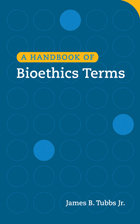
The term bioethics was first used in the early 1970s by biologists who were concerned about ethical implications of genetic and ecological interventions, but was soon applied to all aspects of biomedical ethics, including health care delivery, research, and public policy. Its literature draws from disciplines as varied as clinical medicine and nursing, scientific research, theology and philosophy, law, and the social sciences—each with its own distinctive vocabulary and expressions.
A Handbook of Bioethics Terms is a handy and concise glossary-style reference featuring over 400 entries on the significant terms, expressions, titles, and court cases that are most important to the field. Most entries are cross-referenced, making this handbook a valuable addition to the bookshelves of undergraduate and graduate students in health care ethics, physicians and nurses, members of institutional ethics committees and review boards, and others interested in bioethics.
A sampling of terms from the handbook: AbortionDNR (Do Not Resuscitate)Eugenics Gene therapy Living will Natural lawPrimum non nocere Single-payer systemSurrogate consent Schiavo case
Sample Definitions:
Formalism: In ethical theory, a type of deontology in which an action is judged to be right if it is in accord with a moral rule, and wrong if it violates a moral rule.
Xenograft: Organ or tissue transplanted from one individual to another individual of another species. (See Transplantation, organ and tissue)
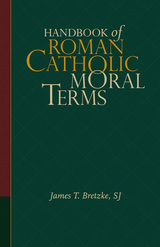
The Handbook of Roman Catholic Moral Terms contains more than 800 moral terms, offering concise definitions, historical context, and illustrations of how these terms are used in the Catholic tradition, including Church teaching and documents.
James T. Bretzke, SJ, places Catholic tradition in a contemporary context in order to illuminate the continuities as well as discontinuities of Church teaching and key directions of Catholic thought. The author also provides extensive cross-referencing and bibliographic suggestions for further research.
Designed to serve as a vital reference work for libraries, students and scholars of theology, priests and pastoral ministers, as well as all adults interested in theological enrichment or continuing education, the Handbook of Roman Catholic Moral Terms is the most comprehensive post–Vatican II work of its kind available in English.

This volume analyzes the politics of hazardous waste siting and explores promising new strategies for siting facilities. Existing approaches to waste siting facilities have almost entirely failed, across all industrialized countries, largely because of community or NIMBY (Not in My Backyard) opposition. This volume examines a new strategy, voluntary choice siting—a process requiring mutual decisions negotiated between facility developers and the host communities. This bottom-up approach preserves democratic rights, recognizes the importance of public perceptions, and addresses issues of equity.
In this collection, an interdisciplinary group of experts probes recent examples of waste facilities siting in the United States, Canada, Germany, and Japan. Both the successes and the failures presented offer practical insights into the siting process. The book includes an introductory review of the literature on facility siting and the NIMBY phenomenon as well as instructive essays on the use of voluntary processes in facilities siting.
This book will be of value to policymakers, industry, and environmental groups, as well as to those working in environmental studies and engineering, political science, public health, geography, planning, and business economics.

What, exactly, does it mean to be human? It is an age-old question, one for which theology, philosophy, science, and medicine have all provided different answers. But though a unified response to the question can no longer be taken for granted, how we answer it frames the wide range of different norms, principles, values, and intuitions that characterize today's bioethical discussions. If we don't know what it means to be human, how can we judge whether biomedical sciences threaten or enhance our humanity?
This fundamental question, however, receives little attention in the study of bioethics. In a field consumed with the promises and perils of new medical discoveries, emerging technologies, and unprecedented social change, current conversations about bioethics focus primarily on questions of harm and benefit, patient autonomy, and equality of health care distribution. Prevailing models of medical ethics emphasize human capacity for self-control and self-determination, rarely considering such inescapable dimensions of the human condition as disability, loss, and suffering, community and dignity, all of which make it difficult for us to be truly independent.
In Health and Human Flourishing, contributors from a wide range of disciplines mine the intersection of the secular and the religious, the medical and the moral, to unearth the ethical and clinical implications of these facets of human existence. Their aim is a richer bioethics, one that takes into account the roles of vulnerability, dignity, integrity, and relationality in human affliction as well as human thriving. Including an examination of how a theological anthropology—a theological understanding of what it means to be a human being—can help us better understand health care, social policy, and science, this thought-provoking anthology will inspire much-needed conversation among philosophers, theologians, and health care professionals.
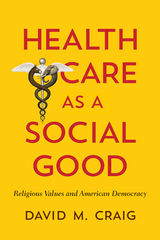
David M. Craig traveled across the United States to assess health care access, delivery and finance in this country. He interviewed religious hospital administrators and interfaith activists, learning how they balance the values of economic efficiency and community accountability. He met with conservatives, liberals, and moderates, reviewing their ideas for market reform or support for the Affordable Care Act. He discovered that health care in the US is not a private good or a public good. Decades of public policy and philanthropic service have made health care a shared social good.
Health Care as a Social Good: Religious Values and the American Democracy argues that as escalating health costs absorb more and more of family income and government budgets, we need to take stock of the full range of health care values to create a different and more affordable community-based health care system. Transformation of that system is a national priority but Americans have failed to find a way to work together that bypasses our differences. Craig insists that community engagement around the common religious conviction that healing is a shared responsibility can help us achieve this transformation—one that will not only help us realize a new and better system, but one that reflects the ideals of American democracy and the common good.

Health Care Ethics is a comprehensive study of significant issues affecting health care and the ethics of health care from the perspective of Catholic theology. It aims to help Christian, and especially Catholic, health care professionals solve concrete problems in terms of principles rooted in scripture and tested by individual experience; however, its basis in real medical experience makes this book a valuable resource for anyone with a general interest in health care ethics.
This fifth edition, which includes important contributions by Jean deBlois, C.S.J., considers everyday ethical questions and dilemmas in clinical care and deals more deeply with issues of women's health, mental health, sexual orientation, artificial reproduction, and the new social issues in health care. The authors devote special attention to the various ethical theories currently in use in the United States while clearly presenting a method of ethical decision making based in the Catholic tradition. They discuss the needs of the human person, outlining what it means to be human, both as an individual and as part of a community.
This volume has been significantly updated to include new discussions of recent clinical innovations and theoretical issues that have arisen in the field:
• the Human Genome Project• efforts to control sexual selection of infants• efforts to genetically modify the human genotype and phenotype• the development of palliative care as a medical specialty• the acceptance of non-heart beating persons as organ donors• embryo development and stem cell research• reconstructive and cosmetic surgery• nutrition and obesity• medical mistakes• the negative effects of managed care on the patient-physician relationship• recent papal allocution regarding care of patients in a persistent vegetative state and palliative care for dying patients

This fourth edition of Health Care Ethics provides a contemporary study of broad and major issues affecting health care and the ethics of health care from the perspective of Catholic teachings and theological investigation.
It aims to help Christian, and especially Catholic, health care professionals solve concrete problems in terms of principles rooted in Scripture and tested by individual experience.
Since the last edition of Health Care Ethics, there have been many changes in the fields of health care medicine and theology that have necessitated a fourth edition. Ashley and O'Rourke have revised their seminal work to address the publication of significant documents by the Church and the restructuring of the health care system.
Features of the revised fourth edition:
• Discusses significant Church documents issued since the third edition includes "The Splendor of Truth" (Veritatis Splendor), and the "Gospel of Life" (Evangelium Vitae); the "Instruction on the Vocation of Theologians"; the Catechism of the Catholic Church; and the Revised Ethical and Religious Directives for Catholic Health Services.
• Examines the implications of managed care techniques.
• Probes such changes in the practice of medicine as the new emphasis on preventive care, the involvement of individuals in their own care, greater use of pharmaceuticals in psychiatry, and the greater role of genetics in diagnosis and prognosis.
• Explores the quest for more compassionate care of the dying.
• Updates the bibliography.

This book illuminates issues in medical ethics revolving around the complex bond between healer and patient, focusing on friendship and other important values in the healing relationship. Embracing medicine, philosophy, theology, and bioethics, it considers whether bioethical issues in medicine, nursing, and dentistry can be examined from the perspective of the healing relationship rather than external moral principles.
Distinguished contributors explore the role of the health professional, the moral basis of health care, greater emphasis on the humanities in medical education, and some of the current challenges facing healers today.

Arguing that health care should be a human right rather than a commodity, the distinguished contributors to this volume call for a new social covenant establishing a right to a standard of health care consistent with society's level of resources. By linking rights with limits, they offer a framework for seeking national consensus on a cost-conscious standard of universal medical care. The authors identify the policy implications of recognizing and implementing such a right and develop specific criteria to measure the success of health care reform from a human rights perspective.
Health Care Reform also offers specific and timely criticism of managed competition and its offspring, the Clinton plan for health care reform. Because health care reform will inevitably be an ongoing process of assessment and revision—especially since managed competition has not been implemented elsewhere—this book will last beyond the moment by providing vital standards to guide the future evolution of the health care system.

In the 1850s, "Drapetomania" was the medical term for a disease found among black slaves in the United States. The main symptom was a strange desire to run away from their masters. In earlier centuries gout was understood as a metabolic disease of the affluent, so much so that it became a badge of uppercrust honor—and a medical excuse to avoid hard work. Today, is there such a thing as mental illness, or is mental illness just a myth? Is Alzheimer's really a disease? What is menopause—a biological or a social construction?
Historically one can see that health, disease, and illness are concepts that have been ever fluid. Modern science, sociology, philosophy, even society—among other factors—constantly have these issues under microscopes, learning more, defining and redefining ever more exactly. Yet often that scrutiny, instead of leading toward hard answers, only leads to more questions. Health, Disease, and Illness brings together a sterling list of classic and contemporary thinkers to examine the history, state, and future of ever-changing "concepts" in medicine.
Divided into four parts—Historical Discussions; Characterizing Health, Disease, and Illness; Clinical Applications of Health and Disease; and Normalcy, Genetic Disease, and Enhancement: The Future of the Concepts of Health and Disease—the reader can see the evolutionary arc of medical concepts from the Greek physician Galen of Pergamum (ca. 150 ce) who proposed that "the best doctor is also a philosopher," to contemporary discussions of the genome and morality. The editors have recognized a crucial need for a deeper integration of medicine and philosophy with each other, particularly in an age of dynamically changing medical science—and what it means, medically, philosophically, to be human.

Public silence in policymaking can be deafening. When advocates for a disadvantaged group decline to speak up, not only are their concerns not recorded or acted upon, but also the collective strength of the unspoken argument is lessened—a situation that undermines the workings of deliberative democracy by reflecting only the concerns of more powerful interests.
But why do so many advocates remain silent on key issues they care about and how does that silence contribute to narrowly defined policies? What can individuals and organizations do to amplify their privately expressed concerns for policy change?
In Healthy Voices, Unhealthy Silence, Colleen M. Grogan and Michael K. Gusmano address these questions through the lens of state-level health care advocacy for the poor. They examine how representatives for the poor participate in an advisory board process by tying together existing studies; extensive interviews with key players; and an in-depth, first-hand look at the Connecticut Medicaid advisory board's deliberations during the managed care debate. Drawing on the concepts of deliberative democracy, agenda setting, and nonprofit advocacy, Grogan and Gusmano reveal the reasons behind advocates' often unexpected silence on major issues, assess how capable nonprofits are at affecting policy debates, and provide prescriptive advice for creating a participatory process that adequately addresses the health care concerns of the poor and dispossessed.
Though exploring specifically state-level health care advocacy for the poor, the lessons Grogan and Gusmano offer here are transferable across issue areas and levels of government. Public policy scholars, advocacy organizations, government workers, and students of government administration will be well-served by this significant study.

Exploring the moral foundations of the healing relationship, Edmund D. Pellegrino and David C. Thomasma offer the health care professional a highly readable Christian philosophy of medicine. This book examines the influence religious beliefs have on the kind of person the health professional should be, on the health care policies a society should adopt, and on what constitutes healing in its fullest sense.
Helping and Healing looks at the ways a religious perspective shapes the healing relationship and the ethics of that relationship. Pellegrino and Thomasma seek to clarify the role of religious belief in health care by providing a moral basis for such commitment as well as a balancing role for reason. This book establishes a common ground for believers and skeptics alike in their dedication to relieve suffering by showing that helping and healing require an involvement in the religious values of patients. It clearly argues that religion provides crucial insights into medical practice and morality that cannot be ignored, even in our morally heterogeneous society.
Central to the authors' message is the concept of patients' vulnerabilities and the need to help them recover not only from the disease but also from an existential assault on their personhood. They then show how this understanding can move caregivers to view their professions as vocations and thereby change the nature of health care from a business to a community of healing.
Physicians, nurses, administrators, clergy, theologians, and other health professionals and church leaders will find this volume helpful for their own reflections on the role of religion in the health care ministry and for making a religious commitment integral to their professional lives.

Most of us are content to see ourselves as ordinary people—unique in ways, talented in others, but still among the ranks of ordinary mortals. Andrew Flescher probes our contented state by asking important questions: How should "ordinary" people respond when others need our help, whether the situation is a crisis, or something less? Do we have a responsibility, an obligation, to go that extra mile, to act above and beyond the call of duty? Or should we leave the braver responses to those who are somehow different than we are: better somehow, "heroes," or "saints?"
Traditional approaches to ethics have suggested there is a sharp distinction between ordinary people and those called heroes and saints; between duties and acts of supererogation (going beyond the expected). Flescher seeks to undo these standard dichotomies by looking at the lives and actions of certain historical figures—Holocaust rescuers, Martin Luther King, Jr., Dorothy Day, among others—who appear to be extraordinary but were, in fact, ordinary people. Heroes, Saints, and Ordinary Morality shifts the way we regard ourselves in relationship to those we admire from afar—it asks us not only to admire, but to emulate as well—further, it challenges us to actively seek the acquisition of virtue as seen in the lives of heroes and saints, to learn from them, a dynamic aspect of ethical behavior that goes beyond the mere avoidance of wrongdoing.
Andrew Flescher sets a stage where we need to think and act, calling us to lead lives of self-examination—even if that should sometimes provoke discomfort. He asks that we strive to emulate those we admire and therefore allow ourselves to grow morally, and spiritually. It is then that the individual develops a deeper altruistic sense of self—a state that allows us to respond as the heroes of our own lives, and therefore in the lives of others, when times and circumstance demand that of us.
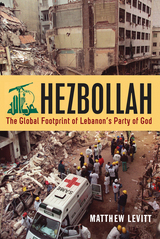
Hezbollah: The Global Footprint of Lebanon's Party of God is the first thorough examination of Hezbollah’s covert activities beyond Lebanon’s borders, including its financial and logistical support networks and its criminal and terrorist operations worldwide.
Hezbollah—Lebanon’s "Party of God"—is a multifaceted organization: It is a powerful political party in Lebanon, a Shia Islam religious and social movement, Lebanon’s largest militia, a close ally of Iran, and a terrorist organization. Drawing on a wide range of sources, including recently declassified government documents, court records, and personal interviews with intelligence and law enforcement officials around the world, Matthew Levitt examines Hezbollah’s beginnings, its first violent forays in Lebanon, and then its terrorist activities and criminal enterprises abroad in Europe, the Middle East, South America, Southeast Asia, Africa, and finally in North America. Levitt also describes Hezbollah’s unit dedicated to supporting Palestinian militant groups and Hezbollah’s involvement in training and supporting insurgents who fought US troops in post-Saddam Iraq. The book concludes with a look at Hezbollah’s integral, ongoing role in Iran’s shadow war with Israel and the West, including plots targeting civilians around the world.
Levitt shows convincingly that Hezbollah’s willingness to use violence at home and abroad, its global reach, and its proxy-patron relationship with the Iranian regime should be of serious concern. Hezbollah is an important book for scholars, policymakers, students, and the general public interested in international security, terrorism, international criminal organizations, and Middle East studies.

"Hezbollah is perhaps the world's most capable group. Terrorism expert Matthew Levitt offers a comprehensive and fascinating assessment of Hezbollah's network outside the Lebanese theater, exposing its operations and fundraising apparatus in Asia, Latin America, Europe, and even the United States." -- Daniel Byman, professor, Center for Security Studies, Georgetown University
"Matthew Levitt is a recognized authority on Hezbollah and its activities, both in the Levant and globally.... Hezbollah: The Global Footprint of Lebanon's Party of God fills a vital gap in understanding the international dimensions of Hezbollah, its reach, and its capacities for terrorism worldwide." -- Charles Allen, former assistant director of the central intelligence for collection, CIA
"Matthew Levitt has made a significant contribution to public understanding of Hezbollah's worldwide operations. He has shone a bright light into some of the darkest corners of the group's activities overseas." -- Richard Barrett, former head of MI6/SIS/British Intelligence's Counter Terrorism Department and coordinator of the United Nations Al-Qaeda-Taliban Monitoring Team
"This book tells the sinister story of a highly sophisticated organization that for more than thirty years has been an archetype of world-wide illicit activities. Hezbollah effectively combines its overt social and political activities with covert criminal and terrorist operations on a global scale. Matthew Levitt's painstaking collection of a rich array of data provides uncomfortable evidence of ' The Global Footprint of Lebanon's Party of God'. This book is essential reading for policy-makers and the international intelligence community." -- Uri Rosenthal, Former Minister of Foreign Affairs, the Netherlands
"In Hezbollah: The Global Footprint of Lebanon's Party of God, Matthew Levitt, through adept storytelling and impressive attention to historical detail, manages to teach even long-time students of the Middle East a great deal about Hezbollah. The book leaves little doubt as to the increasing importance, danger, and international reach of Hezbollah. It will be an important resource for serious scholars of the Middle East and a great read for anyone interested in better understanding the region." -- Andy Liepman, Senior Policy Analyst, RAND Corporation; former Principal Deputy Director, National Counterterrorism Center
"This book on Lebanese Hezbollah is a unique incisive insight into its global terror tentacles around the globe. Noone has catalogued these terrorist connections and plots in such forensic detail as Matthew Levitt, especially how the terror nexus between Hezbollah and Iran has continually evolved. It systematically lays bare Hezbollah's operational capability and its multiple intersections with Iranian intelligence architecture. This should be required reading for every intelligence analyst and terrorism researcher." -- Magnus Ranstrop, research director, Centre for Asymmetric Threat Studies at the Swedish National Defence College
"Matthew Levitt's book touches a key point of the growing debate on Hezbollah: the European approach to the phenomenon. It is a reminder for us Europeans that there are threats that might seem distant geographically, but could nevertheless have a strong impact politically on the continent as well." -- Franco Frattini, Justice and Chamber President of the Italian Conseil d'Etat (Supreme Administrative Court); President of the Italian Society for International Organization (SIOI); former Italian Foreign Minister (2002-2004 and 2008-2011)
"Richard Armitage, then Deputy Secretary of State, once described Hezbollah as the 'A team' of international terror. In his extraordinary new book, Matthew Levitt explains why Hezbollah is seen as such a global threat. Levitt paints a compelling picture of Hezbollah's terror activities not just in the Middle East but throughout Europe, Asia, Africa, and North and South America. While Western intelligence and law enforcement agencies have tracked and disrupted Hezbollah's global activities for years, this highly unsettling story has been largely unknown to wider publics. Thanks to Levitt's meticulous and well-written book that should no longer be the case." -- Ambassador Dennis Ross, counselor at the Washington Institute; former special assistant to President Obama and senior director for the Central Region at the National Security Council
"Matthew Levitt has laid out a timely and relevant history of Hezbollah, a global terrorist organization often referred to as the 'A Team' of terror. This book comes at the right time as Hezbollah continues its decades-long war against the United States, Israel, and our allies around the globe while it attempts to consolidate political power in Lebanon -- on its behalf and for the Iranian regime." -- Juan Zarate, former Deputy National Security Advisor for Combatting Terrorism and author of the forthcoming book, Treasury's War

Long argues that higher education is a moral enterprise and that, as such, it must be guided by a commitments to what is morally right and fundamentally good, not just by what is necessary in intellectual or financial endeavors.
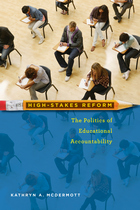
Performance accountability has been the dominant trend in education policy reform since the 1970s. State and federal policies set standards for what students should learn; require students to take “high-stakes” tests to measure what they have learned; and then hold students, schools, and school districts accountable for their performance. The goal of these policies is to push public school districts to ensure that all students reach a common threshold of knowledge and skills.
High-Stakes Reform analyzes the political processes and historical context that led to the enactment of state-level education accountability policies across the country. It also situates the education accountability movement in the broader context of public administration research, emphasizing the relationships among equity, accountability, and intergovernmental relations. The book then focuses on three in-depth case studies of policy development in Massachusetts, New Jersey, and Connecticut. Kathryn McDermott zeroes in on the most controversial and politically charged forms of state performance accountability sanctions, including graduation tests, direct state intervention in or closing of schools, and state takeovers of school districts.
Public debate casts performance accountability as either a cure for the problems of US public education or a destructive mistake. Kathryn McDermott expertly navigates both sides of the debate detailing why particular policies became popular, how the assumptions behind the policies influenced the forms they took, and what practitioners and scholars can learn from the successes and failures of education accountability policies.
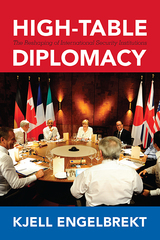
The proliferation of “minilateral” summits is reshaping how international security problems are addressed, yet these summits remain a poorly understood phenomenon. In this groundbreaking work, Kjell Engelbrekt contrasts the most important minilateral summits—the G7 (formerly G8) and G20—with the older and more formal UN Security Council to assess where the diplomacy of international security is taking place and whether these institutions complement or compete with each other.
Engelbrekt’s research in primary-source documents of the G7, G8, G20, and UN Security Council provides unique insight into how these institutions deliberate on three policy areas: conflict management, counterterrorism cooperation, and climate change mitigation. Relatively informal and flexible, GX diplomacy invites more countries to take a seat at the table and allows nontraditional security threats to be placed on the agenda. Engelbrekt concludes, however, that there is a continuing need for institutions like the UN to address traditional security problems.
High-Table Diplomacy will provoke discussion and further research on the role of minilateral summits among scholars of international relations, security studies, and international organizations.
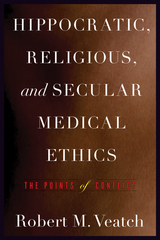
Where should physicians get their ethics? Professional codes such as the Hippocratic Oath claim moral authority for those in a particular field, yet according to medical ethicist Robert Veatch, these codes have little or nothing to do with how members of a guild should understand morality or make ethical decisions. While the Hippocratic Oath continues to be cited by a wide array of professional associations, scholars, and medical students, Veatch contends that the pledge is such an offensive code of ethics that it should be summarily excised from the profession. What, then, should serve as a basis for medical morality?
Building on his recent contribution to the prestigious Gifford Lectures, Veatch challenges the presumption that professional groups have the authority to declare codes of ethics for their members. To the contrary, he contends that role-specific duties must be derived from ethical norms having their foundations outside the profession, in religious and secular convictions. Further, these ethical norms must be comprehensible to lay people and patients. Veatch argues that there are some moral norms shared by most human beings that reflect a common morality, and ultimately it is these generally agreed-upon religious and secular ways of knowing—thus far best exemplified by the 2005 Universal Declaration on Bioethics and Human Rights—that should underpin the morality of all patient-professional relations in the field of medicine.
Hippocratic, Religious, and Secular Medical Ethics is the magnum opus of one of the most distinguished medical ethicists of his generation.
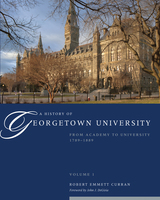
The discovery and imparting of knowledge are the essential undertakings of any university. Such purposes determined John Carroll, SJ's modest and surprisingly ecumenical proposal to establish an academy on the banks of the Potomac for the education of the young in the early republic. What began earnestly in 1789 still continues today: the idea of Georgetown University as a Catholic university situated squarely in the American experience.
Beautifully designed with over 300 illustrations and photographs, A History of Georgetown University tells the remarkable story of the administrators, boards, faculty, students, and programs that have made Georgetown a leading institution of higher education. With a keen eye for detail, historian Robert Emmett Curran—a member of the Georgetown community for over three decades—explores the broader perspective of Georgetown's sense of identity and its place in American culture.
Volume One traces Georgetown’s evolution during its first century, from its beginnings as an academy within the American Catholic community of the Revolutionary War era through its flowering as a college before the Civil War to its postbellum achievements as a university. Volume Two highlights the efforts of administrators and faculty over the next seventy-five years to make Georgetown an ascending and increasingly diverse institution with a range of graduate programs and professional schools. Volume Three examines Georgetown’s remarkable rise to prominence as an internationally recognized research university—both culturally engaged and cosmopolitan while remaining grounded in its Catholic and Jesuit character.
Each volume features numerous illustrations, photographs, and appendices that include student demographics, enrollments, and lists of board members.
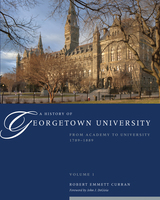
The discovery and imparting of knowledge are the essential undertakings of any university. Such purposes determined John Carroll, SJ's modest and surprisingly ecumenical proposal to establish an academy on the banks of the Potomac for the education of the young in the early republic. What began earnestly in 1789 still continues today: the idea of Georgetown University as a Catholic university situated squarely in the American experience.
Beautifully designed with over 300 illustrations and photographs, A History of Georgetown University tells the remarkable story of the administrators, boards, faculty, students, and programs that have made Georgetown a leading institution of higher education. With a keen eye for detail, historian Robert Emmett Curran—a member of the Georgetown community for over three decades—explores the broader perspective of Georgetown's sense of identity and its place in American culture.
Volume One traces Georgetown’s evolution during its first century, from its beginnings as an academy within the American Catholic community of the Revolutionary War era through its flowering as a college before the Civil War to its postbellum achievements as a university. Volume Two highlights the efforts of administrators and faculty over the next seventy-five years to make Georgetown an ascending and increasingly diverse institution with a range of graduate programs and professional schools. Volume Three examines Georgetown’s remarkable rise to prominence as an internationally recognized research university—both culturally engaged and cosmopolitan while remaining grounded in its Catholic and Jesuit character.
Each volume features numerous illustrations, photographs, and appendices that include student demographics, enrollments, and lists of board members.
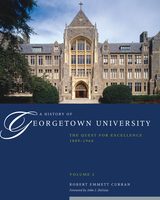
The discovery and imparting of knowledge are the essential undertakings of any university. Such purposes determined John Carroll, SJ's modest and surprisingly ecumenical proposal to establish an academy on the banks of the Potomac for the education of the young in the early republic. What began earnestly in 1789 still continues today: the idea of Georgetown University as a Catholic university situated squarely in the American experience.
Beautifully designed with over 300 illustrations and photographs, A History of Georgetown University tells the remarkable story of the administrators, boards, faculty, students, and programs that have made Georgetown a leading institution of higher education. With a keen eye for detail, historian Robert Emmett Curran—a member of the Georgetown community for over three decades—explores the broader perspective of Georgetown's sense of identity and its place in American culture.
Volume One traces Georgetown’s evolution during its first century, from its beginnings as an academy within the American Catholic community of the Revolutionary War era through its flowering as a college before the Civil War to its postbellum achievements as a university. Volume Two highlights the efforts of administrators and faculty over the next seventy-five years to make Georgetown an ascending and increasingly diverse institution with a range of graduate programs and professional schools. Volume Three examines Georgetown’s remarkable rise to prominence as an internationally recognized research university—both culturally engaged and cosmopolitan while remaining grounded in its Catholic and Jesuit character.
Each volume features numerous illustrations, photographs, and appendices that include student demographics, enrollments, and lists of board members.
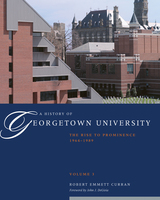
The discovery and imparting of knowledge are the essential undertakings of any university. Such purposes determined John Carroll, SJ's modest and surprisingly ecumenical proposal to establish an academy on the banks of the Potomac for the education of the young in the early republic. What began earnestly in 1789 still continues today: the idea of Georgetown University as a Catholic university situated squarely in the American experience.
Beautifully designed with over 300 illustrations and photographs, A History of Georgetown University tells the remarkable story of the administrators, boards, faculty, students, and programs that have made Georgetown a leading institution of higher education. With a keen eye for detail, historian Robert Emmett Curran—a member of the Georgetown community for over three decades—explores the broader perspective of Georgetown's sense of identity and its place in American culture.
Volume One traces Georgetown’s evolution during its first century, from its beginnings as an academy within the American Catholic community of the Revolutionary War era through its flowering as a college before the Civil War to its postbellum achievements as a university. Volume Two highlights the efforts of administrators and faculty over the next seventy-five years to make Georgetown an ascending and increasingly diverse institution with a range of graduate programs and professional schools. Volume Three examines Georgetown’s remarkable rise to prominence as an internationally recognized research university—both culturally engaged and cosmopolitan while remaining grounded in its Catholic and Jesuit character.
Each volume features numerous illustrations, photographs, and appendices that include student demographics, enrollments, and lists of board members.
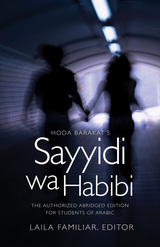
Sayyidi wa Habibi (My Master and My Love) is a novel by acclaimed Lebanese author Hoda Barakat, abridged in the original Arabic in this volume for learners of Arabic at the advanced low proficiency level. Designed as a supplementary text that adds variety and fun to a regular course on Arabic, it is complete with exercises that guide learners through the story and help them improve their Arabic skills, introducing learners of the language to the world of contemporary Arabic literature and improving their knowledge of Arabic culture.
Set against the backdrop of the Lebanese Civil War, this intriguing novel relates the struggles of Wadie, a young man who leaves school and becomes corrupted by crime, and his wife, Samia, who flees with him to Cyprus. Universal questions of existence are masterfully portrayed through eloquent prose that keeps readers engaged until the last line. Laila Familiar provides introductory materials, a short biography of the author, and exercises that develop linguistic and cultural competencies. Audio files of Barakat reading five passages from the work, along with a recorded interview, are available free on the press website in order to help students improve their listening skills.
This authorized version of the abridged text of Sayyidi wa Habibi will be warmly embraced by college and university students of Arabic as well as by independent learners.

In Honest Numbers and Democracy, Walter Williams offers a revealing history of policy analysis in the federal government and a scorching critique of what’s wrong with social policy analysis today. Williams, a policy insider who witnessed the birth of domestic policy analysis during the Johnson administration, contends that the increasingly partisan U.S. political environment is vitiating both "honest numbers" — the data used to direct public policy — and, more importantly, honest analysts, particularly in the White House.
Drawing heavily on candid off-the-record interviews with political executives, career civil servants, elected officials and Washington-based journalists, Williams documents the steady deformation of social policy analysis under the pressure of ideological politics waged by both the executive and legislative branches. Beginning with the Reagan era and continuing into Clinton’s tenure, Williams focuses on the presidents’ growing penchant to misuse and hide numbers provided by their own analysts to assist in major policy decisions.
Honest Numbers and Democracy is the first book to examine in-depth the impact of the electronic revolution, its information overload, and rampant public distrust of the federal government's data on the practice of policy analysis.
A hard-hitting account of the factors threatening the credibility of the policymaking process, this book will be required reading for policy professionals, presidential watchers, and anyone interested in the future of U.S. democracy.
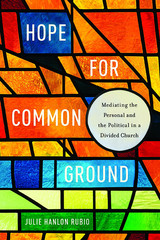
Much like the rest of the country, American Catholics are politically divided, perhaps more so now than at any point in their history. In this learned but accessible work for scholars, students, and religious and lay readers, ethicist Julie Hanlon Rubio suggests that there is a way beyond red versus blue for orthodox and progressive Catholics. In a call for believers on both sides of the liberal-conservative divide to put aside labels and rhetoric, Rubio, a leading scholar in marriage and family for more than twenty years, demonstrates that common ground does exist in the local sphere between the personal and the political.
In Hope for Common Ground, Rubio draws on Catholic Social Thought to explore ways to bring Catholics together. Despite their differences, Catholics across the political spectrum can share responsibility for social sin and work within communities to contribute to social progress. Rubio expands this common space into in-depth discussions on family fragility, poverty, abortion, and end-of-life care. These four issues, though divisive, are part of a seamless worldview that holds all human life as sacred. Rubio argues that if those on different sides focus on what can be done to solve social problems in “the space between” or local communities, opposing sides will see they are not so far apart as they think. The common ground thus created can then lead to far-reaching progress on even the most divisive issues—and help quiet the discord tearing apart the Church.

This book offers a new, interpretive way of understanding organizations and policy by analyzing how they convey meaning through symbolic language, objects, and act. Yanow argues that contested facts in policy often reflect different policy meanings, which are often known tacitly and communicated through the symbols used by an implementing organization.
Yanow argues that policy and organizational actions are often as expressive of group or national identity as they are instrumentally oriented. Drawing on the Israel Corporation of Community Centers as an extended illustration of her arguments, she shows how policy meanings may be communicated to multiple audiences through the agency's actions. Using language, physical artifacts, and acts, Yanow explores how one vision of Israeli identity was communicated tacitly, at a time when Jewish Israeli "ethnicity" was publicly undiscussable. In reading public policies and administrative practices as ways in which a polity constructs and narrates its identity, Yanow shows how the case example raises questions of what it means to be a "good" Israeli.
Unlike most policy studies which consider organizations within a void, How Does a Policy Mean? puts policy in a societal context. Yanow's interpretation of the policy process extends beyond the field of public policy to examine the way organizations establish identity and image for themselves and for the wider public. Her analysis will be of value to those involved in political science, public administration, and organizational studies.

Governments throughout the world confront enormous challenges when divesting. Whether it is poor-performing bank loans in Japan and Korea, military bases in the United States, or real estate in eastern Europe, the challenge of public divestment is more than just a question of how to map a path to economic efficiency. Conventional wisdom in public management and privatization literature says that the execution of such enormous tasks as divestment is typically done poorly, and that the government strategy is likely to be inefficient.
Mark Cassell argues that privatization must be understood as a political and administrative puzzle rather than simply an exercise in economic efficiency. This study of two successful divestment agencies — the U.S. Resolution Trust Corporation and the German Treuhandanstalt — presents a complex understanding of the two agencies' performance in privatizing hundreds of billions of dollars of assets following two very different crises, the savings and loan debacle in the United States and unification in Germany. In the U.S., the worst economic problem since the Great Depression forced the government to recreate and reshape private property on an immense scale. In Germany, melding East and West Germany involved converting an entire national economy that employed more than four million people. In each case, unassuming public agencies handled two of the largest public sales of assets in this century.
Cassell identifies the importance and effects of managerial structures and of national institutions — legislatures and executives — on the outcomes of the reform efforts.
This book will be of interest to those interested in alternatives to traditional public-sector structures, electoral connections to bureaucracies, comparative political economy, and the historic events of the aftermath of the savings and loan crisis and German unification. It is crucial reading for policy and public administration practitioners and scholars alike.
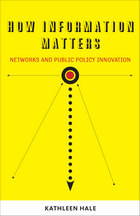
How Information Matters examines the ways a network of state and local governments and nonprofit organizations can enhance the capacity for successful policy change by public administrators. Hale examines drug courts, programs that typify the highly networked, collaborative environment of public administrators today. These “special dockets” implement justice but also drug treatment, case management, drug testing, and incentive programs for non-violent offenders in lieu of jail time. In a study that spans more than two decades, Hale shows ways organizations within the network act to champion, challenge, and support policy innovations over time. Her description of interactions between courts, administrative agencies, and national organizations highlight the evolution of collaborative governance in the state and local arena, with vignettes that share specific experiences across six states (Alabama, Florida, Georgia, Indiana, Missouri, and Tennessee) and ways that they acquired knowledge from the network to make decisions.
How Information Matters offers valuable insight into successful ways for collaboration and capacity building. It will be of special interest to public administrators or policymakers who wish to identify ways to improve their own programs’ performance.

Both "bureaucracy" and "bureaucrats" have taken on a pejorative hue over the years, but does the problem lie with those on the "street-level"—those organizations and people the public deals with directly—or is it in how they are managed? Norma Riccucci knows that management matters, and she addresses a critical gap in the understanding of public policy by uniquely focusing on the effects of public management on street-level bureaucrats.
How Management Matters examines not only how but where public management matters in government organizations. Looking at the 1996 welfare reform law (the Personal Responsibility and Work Opportunity Reconciliation Act, or PRWORA), Riccucci examines the law's effectiveness in changing the work functions and behaviors of street-level welfare workers from the role of simply determining eligibility of clients to actually helping their clients find work. She investigates the significant role of these workers in the implementation of welfare reform, the role of public management in changing the system of welfare under the reform law, and management's impact on results—in this case ensuring the delivery of welfare benefits and services to eligible clients.
Over a period of two years, Riccucci traveled specifically to eleven different cities, and from interviews and a large national survey, she gathered quantitative results from cities in such states as New York, Texas, Michigan, and Georgia, that were selected because of their range of policies, administrative structures, and political cultures. General welfare data for all fifty states is included in this rigorous analysis, demonstrating to all with an interest in any field of public administration or public policy that management does indeed matter.

The idea of voting is simple, but the administration of elections in ways that ensure access and integrity is complex.
In How We Vote, Kathleen Hale and Mitchell Brown explore what is at the heart of our democracy: how elections are run. Election administration determines how ballots are cast and counted, and how jurisdictions try to innovate while also protecting the security of the voting process, as well as how election officials work.
Election officials must work in a difficult intergovernmental environment of constant change and intense partisanship. Voting practices and funding vary from state to state, and multiple government agencies, the judicial system, voting equipment vendors, nonprofit groups, and citizen activists also influence practices and limit change. Despite real challenges and pessimistic media assessments, Hale and Brown demonstrate that election officials are largely successful in their work to facilitate, protect, and evolve the voting process.
Using original data gathered from state and local election officials and policymakers across the United States, Hale and Brown analyze innovations in voter registration, voting options, voter convenience, support for voting in languages other than English, the integrity of the voting process, and voting system technology. The result is a fascinating picture of how we vote now and will vote in the future.
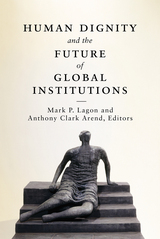
What does human dignity mean and what role should it play in guiding the mission of international institutions? In recent decades, global institutions have proliferated—from intergovernmental organizations to hybrid partnerships. The specific missions of these institutions are varied, but is there a common animating principle to inform their goals? Presented as an integrated, thematic analysis that transcends individual contributions, Human Dignity and the Future of Global Institutions argues that the concept of human dignity can serve as this principle.
Human dignity consists of the agency of individuals to apply their gifts to thrive, and requires social recognition of each person's inherent value and claim to equal access to opportunity. Contributors examine how traditional and emerging institutions are already advancing human dignity, and then identify strategies to make human dignity more central to the work of global institutions. They explore traditional state-created entities, as well as emergent, hybrid institutions and faith-based organizations. Concluding with a final section that lays out a path for a cross-cultural dialogue on human dignity, the book offers a framework to successfully achieve the transformation of global politics into service of the individual.

Human Rights after Hitler reveals thousands of forgotten US and Allied war crimes prosecutions against Hitler and other Axis war criminals based on a popular movement for justice that stretched from Poland to the Pacific. These cases provide a great foundation for twenty-first-century human rights and accompany the achievements of the Nuremberg trials and postwar conventions. They include indictments of perpetrators of the Holocaust made while the death camps were still operating, which confounds the conventional wisdom that there was no official Allied response to the Holocaust at the time. This history also brings long overdue credit to the United Nations War Crimes Commission (UNWCC), which operated during and after World War II.
From the 1940s until a recent lobbying effort by Plesch and colleagues, the UNWCC’s files were kept out of public view in the UN archives under pressure from the US government. The book answers why the commission and its files were closed and reveals that the lost precedents set by these cases have enormous practical utility for prosecuting war crimes today. They cover US and Allied prosecutions of torture, including “water treatment,” wartime sexual assault, and crimes by foot soldiers who were “just following orders.” Plesch’s book will fascinate anyone with an interest in the history of the Second World War as well as provide ground-breaking revelations for historians and human rights practitioners alike.

The major humanitarian crises of recent years are well known: the Shoah, the killing fields of Cambodia, the Rwandan genocide, the massacre in Bosnia, and the tsunami in Southeast Asia, as well as the bloody conflicts in South Sudan, Syria, and Afghanistan. Millions have been killed and many millions more have been driven from their homes; the number of refugees and internally displaced persons has reached record levels. Could these crises have been prevented? Why do they continue to happen? This book seeks to understand how humanity itself is in crisis, and what we can do about it.
Hollenbach draws on the values that have shaped major humanitarian initiatives over the past century and a half, such as the commitments of the International Committee of the Red Cross, Oxfam, Doctors Without Borders, as well as the values of diverse religious traditions, including Catholicism, to examine the scope of our responsibilities and practical solutions to these global crises. He also explores the economic and political causes of these tragedies, and uncovers key moral issues for both policy-makers and for practitioners working in humanitarian agencies and faith communities.
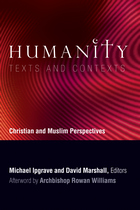
Humanity: Texts and Contexts is a record of the 2007 Singapore “Building Bridges” seminar, an annual dialogue between Muslim and Christian scholars cosponsored by Georgetown University and the Archbishop of Canterbury. This volume explores three central questions: What does it mean to be human? What is the significance of the diversity that is evident among human beings? And what are the challenges that humans face living within the natural world?
A distinguished group of scholars focuses on the theological responses to each of these questions, drawing on the wealth of material found in both Christian and Islamic scriptures. Part one lays out the three issues of human identity, difference, and guardianship. Part two explores scriptural texts side by side, pairing Christian and Islamic scholars who examine such themes as human dignity, human alienation, human destiny, humanity and gender, humanity and diversity, and humanity and the environment. In addition to contributions from an international cast of outstanding scholars, the book includes an afterword by Archbishop Rowan Williams.
READERS
Browse our collection.
PUBLISHERS
See BiblioVault's publisher services.
STUDENT SERVICES
Files for college accessibility offices.
UChicago Accessibility Resources
home | accessibility | search | about | contact us
BiblioVault ® 2001 - 2024
The University of Chicago Press









